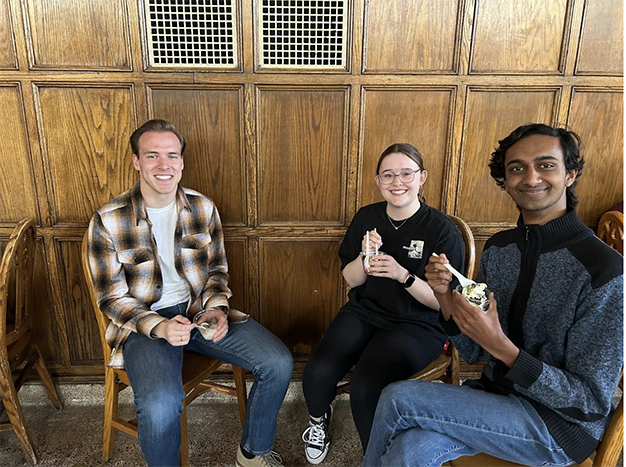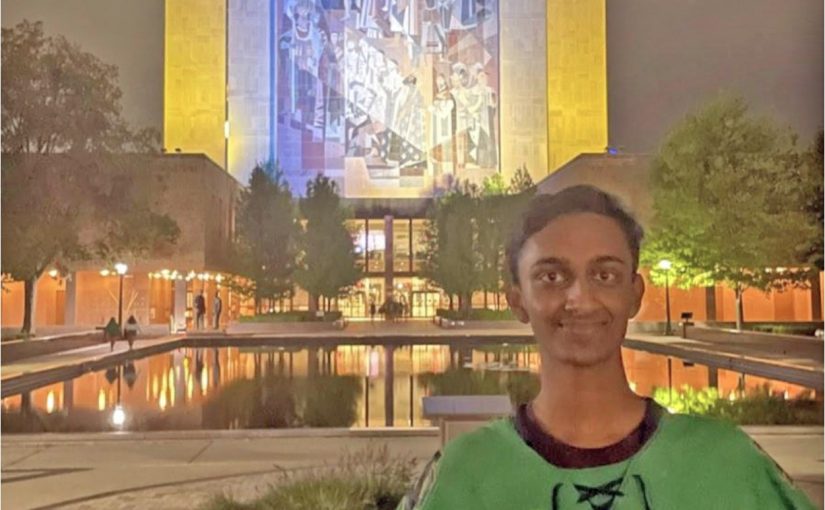By Ashwin Raghuraman
My choice to come to northern Indiana to study global affairs came as quite a shock to both me and my friends back home; however, my first year in the Keough School has been beyond anything I could’ve dreamed. The opportunities I’ve been presented with, the experiences I’ve had, and the friends I’ve made have shaped my world in surprising ways.
The day I arrived at Notre Dame, I was a poorly dressed bundle of excitement. I thought every first experience — seeing the Grotto and the Basilica, watching the fat squirrels, meeting an uncountable number of people — was magical. I thoroughly enjoyed all my first experiences on campus and entered the Keough School with wide eyes.
After greeting my fellow first years, my boundless enthusiasm suddenly and unexpectedly gave way to overwhelm, followed by a breakdown into tears in my RA’s room. Moving into college by myself, while not fitting the stereotypical Notre Dame archetype of a white conservative Catholic American, was by far the scariest thing I’d done so far. However, I have found a home in the Keough School that has welcomed me with open arms, gifting me with friendship, mentorship, and a sense of belonging.

The first door that my global affairs education has opened is learning beyond the classroom. We are encouraged by our professors and by each other to dive into complex global issues and apply them, whether through conversations in the dining hall or other campus restaurants, research, or in other classes. This idea that our education doesn’t end when we turn in an essay or exam, but rather just begins – that is what differentiates the Keough School. My first class was Introduction to Global Affairs with Iris Ma (which remains one of my favorite classes that I’ve taken). That class served as a model for how my other courses would go: readings that occasionally went over my head, thought-provoking discussions during class, and debriefing with my friends after class to connect themes to the “real world.” I made some of my first friends in Dr. Ma’s class, and was guided into a new way of thinking, where the application of concepts is as important as learning those concepts.

This model of learning soon became the norm for me in the Keough School, where I’m faced with complex global issues ranging from ethical and political challeges to development to human rights, engaging in meaningful dialogue both inside and outside the classroom. My learning doesn’t end when the class ends — instead, I share dinners with global affairs friends to pore over concepts, and having late-night conversations about upcoming readings is the norm.
The second door that the Keough School has opened for me, more abstractly speaking, is passion. What’s unique about a Keough School education is that my learning is rooted in both theory and practice. One of my favorite classes last semester, a course on refugee rights, sparked my research interest in refugee education policy. My professor, William Tobin, guided my initial exploration of this topic. Through programs in the Keough School’s Kellogg Institute such as the Developing Researchers Program and under Dr. Tobin’s guidance, I was able to begin applying what I learned to tangible research. When I was exploring discussions last semester in my Intro to Peace Studies class, taught by Gwendolyn Purifoye, about the Rwandan genocide, and I saw this semester that there was a Hesburgh lecture on the topic, I jumped on the chance to attend it.
I am also studying Russian, and feeling that my study wouldn’t be complete without cultural immersion, I applied for, and received, a Nanovic Institute Pushkin Grant through the Summer Language Abroad Scholarship to go to Kyrgyzstan this summer not only to improve my language skills, but also learn more about a distinct culture. This holistic approach to education, where the Keough School will help me to develop my passions and go beyond the theory, makes a global affairs degree that much more valuable. It’s not just a string of readings and tests and papers; rather, it is a way of thinking, and a means to enact change with that thought.
Quite unexpectedly, the third door that the Keough School opened for me is a direct line of communication with faculty members who serve as my role models. I can knock on a professor’s door and have a conversation about a recent political development, or ask a professor to dinner. I can also have complex discussions of ethics and development and religion with faculty members outside the classroom. Professors welcome students almost as if they were family. Not only does this mentality foster a deep sense of community, but it also enables mentorship opportunities that are valuable for future growth.

The Keough School has become my new home away from home, a place where I can engage in education beyond reading, writing, and taking tests; a place where I can truly engage in my passions. A global affairs education is not just a degree: it’s a community with a shared commitment to curiosity, exploration, and action. It’s where I’ve made some of my closest friends so far, and where I’ve defined myself both academically and professionally. Late-night study sessions, shared laughter and tears, deep ethical discussions, and a common desire for a more just world: that is, at heart, what studying global affairs has unlocked for me.
Ashwin Raghuraman is a first-year student from Fremont, California and Perth, Australia studying global affairs and Russian.

